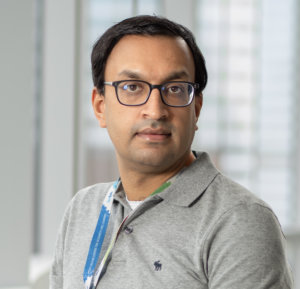Q’n’A with Pediatric Brain Tumour Researcher Dr. Vijay Ramaswamy
Brain Tumour Foundation of Canada is focusing our 2021 research grants on pediatric brain tumours. In the leadup to our 2021 pediatric research grants, we asked both a researcher and a pediatric brain tumour patient for their insights to broaden our understanding of different aspects of the disease, its treatments and its longer-term effects.
Dr. Vijay Ramaswamy
Neuro-Oncologist, Researcher at SickKids, Toronto
 How did you decide to pursue pediatric brain tumour research?
How did you decide to pursue pediatric brain tumour research?
I decided to pursue pediatric brain tumour research because current treatments are not adequate, and as a neuro-oncologist it is very difficult to accept that in many of our tumour types we are using the same treatments for the past 30-40 years. I’ve always been fascinated by the developing brain and its always intrigued me why some children develop brain tumour and others don’t.
How did you connect with Brain Tumour Foundation of Canada?
I connected to Brain Tumour Foundation of Canada in two ways: First my wife has been the recipient of a Brain Tumour Foundation of Canada fellowship which prompted me to apply for a research grant, which I was fortunate enough to be awarded.
Have you personally met any pediatric brain tumour patients? If so, what did you learn from them? Has it changed your approach to work?
I treat children with brain tumours daily in my clinical practice, and I learn from them every time I see them. Specifically what I have learned is that children are not the same as adults, and need really specific approaches that take into account differences in their brain tumour, and their rapidly developing brain. I’ve learned that we need less toxic and more precise therapies for children where we acknowledge that every child with a brain tumour is unique, and should be treated as such.
What inspires you?
I’m inspired by the resilience that children and their families with brain tumours have, irrespective of which type of tumour they have.
What is your biggest research accomplishment?
My biggest research accomplishment has been to have the opportunity to be able to work with an incredible Canadian and global community of scientists and clinicians, with a unified and focused goal of developing new cures for children with brain tumours.
If you could have one research question answered, what would it be?
I would love to understand why some tumours respond well to our current treatments, and why some do not respond at all, despite looking similar at a molecular level. If we can somehow understand why a tumour doesn’t respond to treatment, we can exploit this to develop new approaches.
Read pediatric patient Adam Pike’s perspective here.